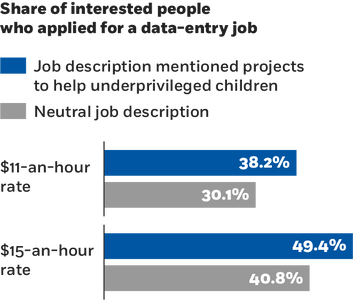Social Impact InsightsOur blog provides insights for social impact professionals in business and nonprofits. We offer advice on making the greatest impact in your organization by giving clear real-world advice on important topics of today.
|
 Written by Alina Dizik for Chicago Booth. Published June 11, 2018. A company, if it clearly conveys during the recruiting process its intent to benefit society, can see lasting benefits, research finds. University of Chicago’s Daniel Hedblom, Queen’s University’s Brent R. Hickman, and List used data to track how advertising a company’s support of a nonprofit impacted recruiting and work quality. To do this, they performed an experiment that doubled as a business venture, which involved launching a data-collection consulting company and hiring 170 part-time workers in 12 US cities. The initial job descriptions they posted were identical, but the researchers tweaked the job details in later emails. When people inquired about positions, they received an email saying the work would consist of either data entry or data entry to benefit underprivileged children. The researchers also varied pay rates, offering some applicants $15 an hour and others $11. When hired, employees were assigned data-entry tasks that involved looking at Google Street View. Some were asked to tally the number of broken windows or potholes in each image, which produced data that was used in some cases to help identify safe areas near schools where administrators were trying to help students avoid gang violence, and in other cases to benefit Uber. (List is a consultant for Uber.) Workers who expressed interest in a data-collection company, created as part of a study, were more likely to apply when the position’s social impact was advertised. 1  Helping schoolkids involved a social impact—and had a big effect on recruiting. When that social mission was mentioned in emails, the company saw 26 percent more people interested in the job, comparable to the 33 percent bump the company saw when it offered $15 an hour. Advertising jobs that had a social mission improved the pool of applicants, with no additional, and potentially expensive, recruiting tactics required. “This generation of young workers is more compelled than previous generations to do social good,” List says. People who accepted a job originally advertised as CSR-driven were also more effective at work. Employees in the CSR group were more productive, analyzing images in a shorter amount of time than other workers. And while all employees could work any number of hours over a 10-day period, those in the CSR group worked longer hours. Both women and men were affected by corporate responsibility, but in different ways. Women were 40 percent more productive in accurately analyzing Google Street View images as a result of CSR and worked an hour more per day. Men produced higher-quality results but did not increase the number of images that they analyzed. “Together, these insights suggest that CSR draws out higher output from women and higher quality from men,” the researchers write. “CSR should not be viewed as a necessary distraction from a profit motive, but rather as an important part of profit maximization similar to other non-pecuniary incentives.” Customers and employees, List assures, will still view CSR as authentic, even if it is recognized to boost profits. While the results suggest that CSR can have strong, positive effects, List recommends companies keep the findings on moral licensing in mind and monitor employee behavior. He notes that because so much behavior is driven subconsciously, simply making employees aware of the tendency to couple good actions with bad could counteract the bias. WORKS CITED
1 Comment
Leave a Reply. |
 RSS Feed
RSS Feed



